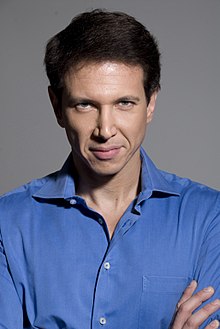Ronen Bergman
Ronen Bergman (born June 6, 1972 in Israel ) is an Israeli investigative journalist and security and intelligence expert.
Bergman grew up in the Kiryat Bialik suburb of Haifa . His mother was a Holocaust survivor from Poland. He did his military service in the intelligence department of the military police. He studied law at Haifa University and was admitted to the bar. He then worked for the Attorney General's Office in Israel before studying history and international relations at Cambridge University (Corpus Christi College), where he received his doctorate with a dissertation on the Mossad . Bergman was a journalist and columnist for the Israeli daily Haaretz and is with Jedi'ot Acharonotas chief correspondent for military and intelligence topics. He is also a co-anchorman on an Israeli television show.
He wrote a number of books, for example about the Mossad (including Rise and Kill First / The Shadow War about targeted attacks by the Mossad to kill opponents who, according to Bergman, killed around 3,000 people in 70 years, as well as bystanders in addition to the actual targets ) and the covert war against Iran, about the Yom Kippur War , missing Israeli soldiers and prisoners of war, but he also writes about corruption affairs in Israel and Palestine (such as the misuse of taxpayers' money for the personal gain of Yasser Arafat ). In his journalistic work on the Mossad, he often relies on anonymous intelligence sources or alumni of the intelligence services. His book The Shadow War was not approved for publication in Israel in 2018 on suspicion of betrayal. The book reports on planned attempts by the Mossad to assassinate Arafat (although it remains open whether the Mossad had anything to do with his death, Israel officially promised the US to refrain from such attempts), reports that Wadi Haddad is slowly leaving the Mossad was poisoned by his toothpaste and that the German arms dealer Heinz Krug , who was significantly involved in the Egyptian missile program, was kidnapped by the Mossad in 1962, killed and his body thrown over the Mediterranean.
He is a regular at international forums on security issues (such as the Munich Security Conference) and a guest on television channels such as the BBC and Al Jazeera. He has also written for international magazines such as The New York Times, Wall Street Journal, Foreign Affairs, Newsweek, The Times, Guardian, Frankfurter Allgemeine Zeitung, and Süddeutsche Zeitung. A question from Bergman at the Munich Security Conference 2018 to the Polish Prime Minister about the Polish Holocaust Act triggered a scandal after he replied that there had been Jewish perpetrators during the Holocaust.
In 2017 he won the Sokolov Prize for Journalism from the cities of Tel Aviv and Jaffa. Among other things, his interview with Brigadier General Yitzhak Yaakov , head of weapons research in the Israeli army, his interview with Mossad chief Meir Dagan , exposure of recordings of radio communications during the Yom Kippur war, scandals at the national forensic institute Abu Kabir (which in a few cases knowingly disregarding court orders and withholding material information from the defense) and a smallpox vaccine scandal.
Fonts (selection)
- The secret war with Iran, Simon and Schuster 2008
- Rise and Kill First: The Secret History of Israel's Targeted Assassinations, Penguin, Random House 2018
- German translation: The Shadow War: Israel and the Mossad's Secret Killing Squads, DVA 2018
Web links
Individual evidence
- ^ Anja Reich, investigative journalist Ronen Bergman The Man Who Infiltrated the Mossad , Berliner Zeitung, March 25, 2018
- ↑ Meir Turgeman, journalist Ronen Bergman wins Sokolow Prize , June 26, 2017
- ↑ Tova Tzimuki, Ronen Bergman, Report: State Prosecution withheld autopsy findings that could have led to acquittal , ynet.news, May 28, 2017
- ↑ Willi Winkler, Vergeltung , Süddeutsche Zeitung, February 27, 2018. Winkler sees the book as an uncritical glorification of the Mossad.
| personal data | |
|---|---|
| SURNAME | Bergman, Ronen |
| BRIEF DESCRIPTION | Israeli journalist |
| DATE OF BIRTH | June 6, 1972 |
| PLACE OF BIRTH | Israel |
